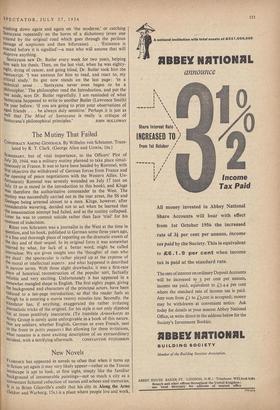The Mutiny That Failed
CONSPIRACY AMONG GENERALS. By Wilhelm von Schramm. Trans- lated by R. T. Clark. (George Allen and Unwin, 16s.) StinsiotARv, but of vital importance, to the Officers' Plot of itilY 20, 1944, was a military mutiny planned to take place simul- taneously in France. It was to have been headed by Rommel, with first objective the withdrawal of German forces from France and the opening of peace negotiations with the Western Allies. Un- fortunately Rommel was severely wounded on July 17 (not on inlY 19 as is stated in the introduction to this book), and Kluge Was therefore the authoritative commander in the West. The trintiny was successfully carried out in the rear areas, the SS and Gestapo being arrested almost to a man. Kluge, however, after considerable wavering, decided not to act when he learned that the assassination attempt had failed, and so the mutiny collapsed. Later he was to commit suicide rather than face 'trial' for his inoment of indecision.
Ritter von Schramm was a journalist in the West at the time in 9tlestion, and his book, published in German some three years ago, Is a fine and thorough piece of reporting on the dramatic events of the day and of their sequel. In its original form it was somewhat inarred by what, for lack of a better word, might be called Journalese. We are given insight into the 'thoughts' of men who are dead : the spectacular is rather played up at the expense of the moral or intellectual aspects: and what happened is described in narrow terms. With those slight drawbacks, it was a first-rate Piece of historical reconstruction of the popular sort, factually reliable and very exciting. Unfortunately it has appeared in a somewhat mangled shape in English. The first eighty pages, giving the background and characters of the principal actors, have been reduced to a ten-page introduction, so that the reader feels as though he is entering a movie twenty minutes late. Secondly, the translator has, if anything, exaggerated the rather irritating l°ornalistic tricks of the original, for his style is not only slipshod but at times positively inaccurate. (To translate Arnteekorps as Arm- y Group is surely quite unforgivable in a book of this nature.
Nor are soldiers, whether English, German or even French, sent tO the front in petits paquets.) But allowing for these irritations, What remains is a most exciting description of an extraordinary


































 Previous page
Previous page